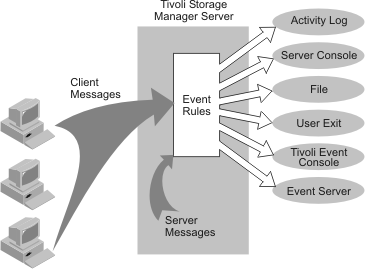The server and client messages provide a record of Tivoli® Storage Manager activity that you can use to monitor the server. You can log server messages and most client messages as events to one or more repositories called receivers.
About this task
You can log the
events to any combination of the following
receivers:
- Tivoli Storage Manager server console and activity log
- See Logging events to the IBM Tivoli Storage Manager server console and activity log.
- File and user exits
- See Logging events to a file exit and a user exit.
- Tivoli event console
- See Logging events to the Tivoli Enterprise Console.
- Event server receiver (Enterprise Event Logging)
- Routes the events to an event server. See Enterprise event logging: logging events to another server.
- Simple Network Management Protocol (SNMP)
- See Logging events to an SNMP manager.
 The Windows Event Log
The Windows Event Log See Logging events to the Windows event log.
See Logging events to the Windows event log.
In addition, you can filter the types of events to be enabled for logging. For example, you might enable only severe messages to the event server receiver and one or more specific messages, by number, to another receiver. Figure 1 shows a possible configuration in which both server and client messages are filtered by the event rules and logged to a set of specified receivers.
Figure 1. Event logging overview

| Task | Required Privilege Class |
|---|---|
| Enable or disable events Begin or end event logging |
System |
You can
control event logging through the following actions:
- Enable or disable logging for one or more event types and for one or more receivers. See Enabling and disabling events.
- Begin or end logging to one or more receivers. See Beginning and ending event logging.